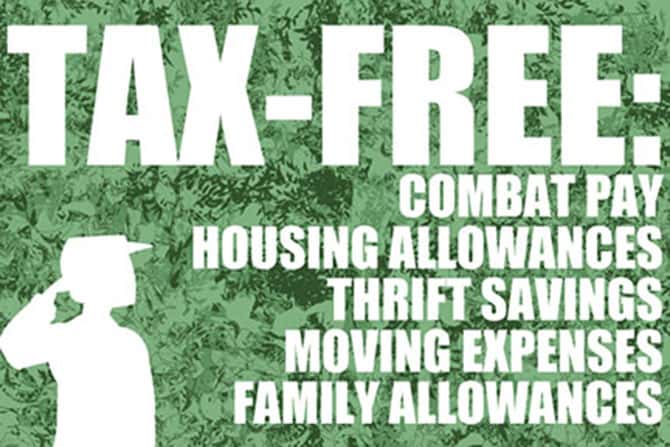tax tips | July 31, 2019 | By Susannah McQuitty

Members of the United States Armed Forces have to file their taxes just like everyone else—almost exactly like everyone else, in fact. Men and women in the military can file their taxes online and follow almost exactly the same process as civilian taxpayers. The exceptions are usually related to tax-free benefits for military members, and those benefits can keep more money in your pockets by lowering your tax obligation.
Here is an overview of the most common tax-saving items that military personnel can use.
Combat pay is tax free
Combat zones are hostile areas recognized and designated by the President of the United States in an Executive order, and the IRS allows tax relief for Armed Forces members stationed there. Any wages earned while stationed in a combat zone are tax free, though officers (excluding commissioned warrant officers) are limited to $8,586 per month of tax-free wages.
Combat pay can boost your tax savings even further, because even though it’s not taxable income, it can still qualify you for the Earned Income Credit (EIC). Since the EIC is a refundable credit, you may get a refund even if you didn’t owe taxes throughout the year.
When you receive your W-2, any tax-free combat pay will be reported as such, so you won’t have to do any extra work when filing your tax return.
Allowances for housing and contributions to qualified savings are tax free
For military personnel, housing allowance is called Basic Allowance for Housing (BAH) and is totally tax free. Same goes for contributions to a Thrift Savings Plan (TSP): Anything you contribute won’t be taxed, so you can deduct the total from your taxable income without itemizing.

Military moving expenses are tax free
More good news here: Though the moving expense deduction was eliminated for civilian taxpayers by the Tax Cuts and Jobs Act of 2017 (TCJA), members of the Armed Forces can still deduct eligible unreimbursed moving expenses. Hopefully most of your moving expenses will be provided by the military, but anything you have to pay out-of-pocket is deductible on your tax return.
Reservists may still be able to deduct out-of-pocket work expenses
Work-related expenses not covered by your employer are no longer deductible for civilians (again, due to the TCJA), but reservists can use Form 2106 to claim this deduction and lower their taxable income. You can claim the deduction for out-of-pocket expenses directly related to your job, as long as you were not reimbursed by your employer.
Other tax-free allowances
When you are provided with allowances that relate directly to the military, you won’t be taxed on the amount of the allowances. Most can be divided into the following categories:
- Family allowances: For expenses related to dependents and your spouse
- Travel/moving allowances: For expenses incurred due to change of station or re-assignment
- Living allowances: A cost-of-living adjustment associated with a high-cost posting station
- Death allowances: For funeral services and burial expenses
That about wraps it up for tax-free wages, expenses, and allowances. Let’s shift gears and take a look at how you can lower your tax obligation by choosing a state domicile.

State taxes and choosing a domicile
It’s no secret that the military will probably keep you on the move between bases for training and other purposes. Many of these moves are between states, so rather than set up residency each time, military members choose a “domicile.” Your domicile is the place where you lived prior to the military, or the place you intend to live after you retire from service.
While you don’t have to live, work, or be stationed in your domicile during your service years, you will be subject to taxes from that state, as well as being registered to vote there and licensed to drive. You’ll want to consider these factors before choosing a state to register as your domicile.
Since each state taxes military income differently, you might want to register with a state that has no income tax: Nevada, New Hampshire, Tennessee, Texas, South Dakota, Washington, Wyoming, Florida and Alaska all fall into that category. Some states with no income tax have high property tax, however, so having several cars in your family may have an effect. Be sure to take your personal situation into account while researching each state before you make a decision.
Your civilian spouse can have a domicile too
Because of updates in 2018 to the Military Spouse Residency Relief Act, or MSRRA, your civilian spouse can also choose to be taxed by your domicile instead of the state where you both live. That way, even though they don’t serve in the military, they can get the same state tax treatment.
Active duty overseas gives extra time to file
If April rolls around and you’re not in the states to manage your tax records and get everything straightened away, you can take advantage of the automatic two-month extension for overseas military personnel. Your taxes will be due June 15 instead of April 15, and if that’s not enough time, you can request an additional four months by filing a Form 4868 to extend your deadline to October 15. If you still need more time, file for a December 15 extension to get another two months.
Now that you know about tax-free wages, expenses, and income, and how to set up your domicile for optimal tax savings, you should have a pretty good strategy to lower your tax obligation and end up with more money in your pocket—especially when you file with 1040.com.



